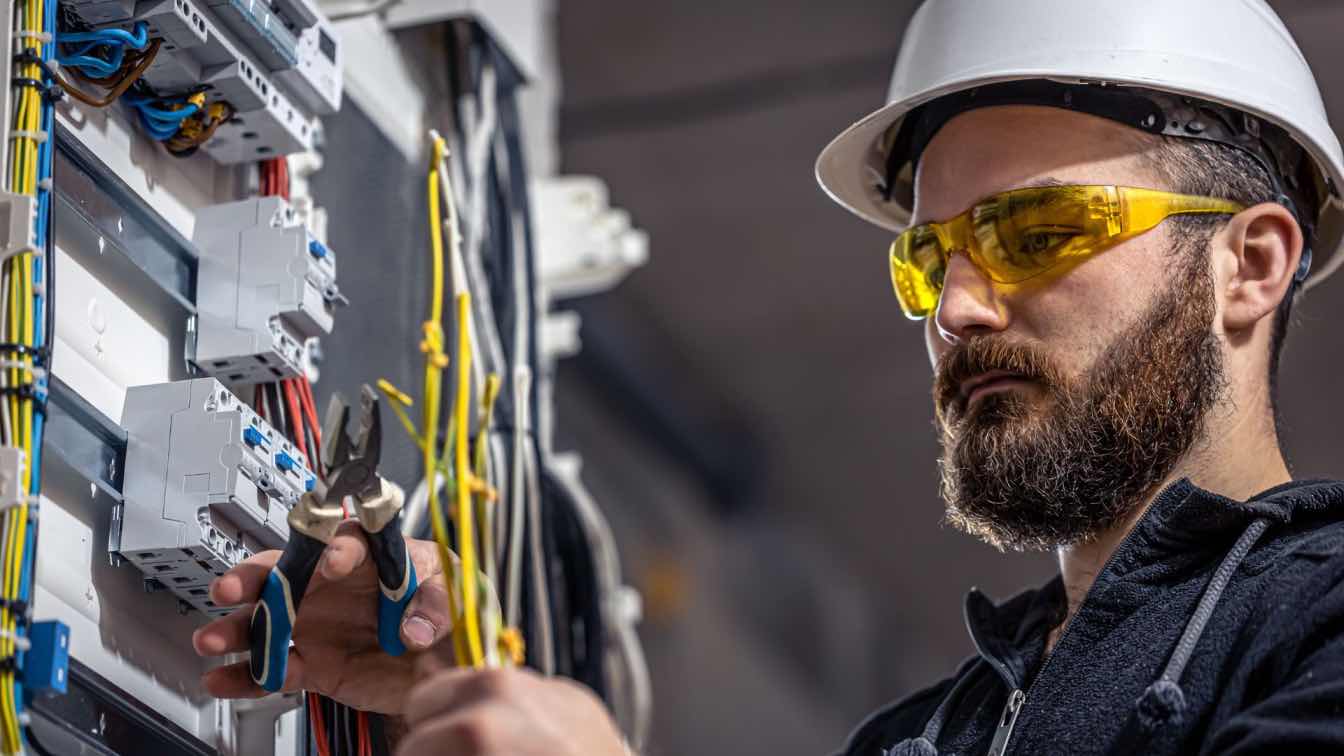Introduction: The Importance of Professional Electrical Work
Electrical installations are a key part of modern homes and businesses. These systems power our daily lives, from lights to appliances to complex equipment. But electrical work can be dangerous if not done right. Mistakes can cause fires, injuries, and legal problems. This is why licensed electricians are so important. They have the special knowledge and skills to make sure electrical systems are safe, work well, and follow the rules.
Licensed electricians know a lot about electricity, safety rules, and the best ways to do things. This is really important now because we keep needing more electricity and new technologies in our homes and workplaces.
Let's look at why using a qualified professional for electrical work is so important. We'll talk about safety, legal requirements, and the benefits of hiring a licensed electrician. Understanding this will help us see why licensed electricians are so important for keeping our electrical systems safe and working well.
Key Responsibilities of Licensed Electricians
1. Ensure compliance with electrical codes
2. Obtain necessary permits and approvals
3. Design and implement safe electrical systems
4. Troubleshoot complex electrical issues
5. Provide expert advice on electrical matters
6. Stay updated with latest industry standards
Understanding the Role of a Licensed Electrician
What Qualifications Are Required?
Becoming a licensed electrician takes a lot of hard work and learning. They need to go to school, train on the job, and pass tough tests. Most places make electricians do an apprenticeship that can last up to four years. During this time, they learn about electrical theory, safety rules, and how to do the job. This hands-on experience helps them learn how to solve problems and use their skills.
After the apprenticeship, electricians have to work for a certain number of hours and pass licensing exams. These tests check if they know about electrical codes, safety practices, and how to solve problems. The exams cover a lot of topics like designing circuits, figuring out how much power is needed, and safety procedures. Electricians also need to keep learning to stay up-to-date with new technology and changes in the rules. This ongoing learning is really important because technology and safety standards are always changing.
Distinction Between Licensed vs. Unlicensed Work
There's a big difference between licensed and unlicensed electrical work. Licensed electricians are allowed by law to do all kinds of electrical jobs, from installing to fixing and maintaining. They have to follow strict rules set by official groups. This means their work is safe and good quality, which gives peace of mind to property owners.
Unlicensed workers don't have the proper training, legal permission, or responsibility that comes with a license. They might be cheaper, but their work can be really risky. Unlicensed work often isn't safe and can cause dangerous situations and legal problems. These workers might not know about current rules and best practices, which makes mistakes and safety hazards more likely. Also, if unlicensed workers do electrical work, it might cancel warranties on electrical equipment and cause problems with insurance if accidents happen.
The Scope of Responsibilities
Licensed electricians have many important jobs. They make sure all installations follow local and national electrical rules. This includes picking the right materials, designing good systems, and putting in safety measures to prevent electrical dangers. They often have to read complex electrical plans and make them work in real buildings, which needs a lot of technical knowledge and problem-solving skills.
Licensed electricians also have to get permits, work with inspectors, and keep records of their work. These records are important for future maintenance or upgrades. They're really good at fixing problems, upgrading old systems, and giving expert advice about electricity. They often help plan for energy efficiency, system upgrades, and long-term electrical needs for homes and businesses.
Safety Implications of DIY or Unlicensed Electrical Work
Common Hazards and Case Studies
DIY or unlicensed electrical work can be really dangerous. Common problems include wrong wiring, overloaded circuits, and bad grounding. These can cause electrical fires, shocks, and even deaths. A study found that home electrical fires cause about 51,000 fires each year, with nearly 500 deaths and over 1,400 injuries. Many of these happen because of bad installations or repairs by people who aren't qualified. The dangers aren't always immediate; poorly done electrical work can create hidden problems that might not show up for years.
Real stories show how bad amateur electrical work can be. In one case, a homeowner tried to install a new light and caused a house fire because of wrong wiring. The fire spread quickly through the walls, damaging the house and putting people in danger. Another time, a business owner hired an unlicensed worker to upgrade their electrical panel. This led to frequent power outages and eventually needed a complete system redo by a licensed professional. It cost a lot of money and disrupted the business for a long time. These examples show why professional electrical work is so important for keeping people and property safe.
Fire Risks, Electrocution, and Liability Issues
One of the biggest dangers of bad electrical work is fire. Faulty wiring, overloaded circuits, and using the wrong materials can all cause electrical fires. These fires often start inside walls or ceilings, making them extra dangerous because they can spread without anyone noticing for a while. Electrical fires can smolder for hours before becoming obvious, often happening when people are asleep or away from home. The National Fire Protection Association says electrical problems are the second biggest cause of home fires in the U.S., showing how important proper electrical installations are for preventing fires.
Electrocution is another big risk with amateur electrical work. Bad grounding, exposed wires, or wrong connections can create shock hazards for people in the building and future workers. Electrical shocks can range from minor injuries to fatal accidents. Even low-voltage shocks can be serious, especially for people with health problems. The risk of electrocution isn't just for the person doing the work; badly done electrical work can create hidden dangers for future residents or maintenance workers who might touch the faulty system.
There are also legal issues with unlicensed electrical work. Property owners who knowingly use unlicensed electricians might be responsible for any injuries or damage caused by faulty installations. Insurance companies might not pay for claims related to fires or injuries caused by unlicensed electrical work, leaving property owners to pay for everything themselves. For businesses, this could mean expensive lawsuits and damage to their reputation. The legal consequences of using unlicensed electrical services can be much more than just the initial cost savings, possibly leading to long-term financial and legal problems.
Long-term Cost vs. Short-term Savings
While DIY or unlicensed electrical work might seem cheaper at first, it often costs much more in the long run. Badly installed electrical systems usually need big repairs or complete replacements. The cost of fixing these problems, plus possible property damage or medical bills from accidents, can be way more than the initial savings. Often, property owners end up paying twice - once for the bad installation, and again for a licensed professional to fix the problems and make everything meet the rules.
Bad electrical work can also lower property values. When selling a property, electrical systems that don't meet code requirements or don't have proper documentation can fail inspections, delay sales, or reduce selling prices. The long-term money problems from cutting corners on electrical work can be big and far-reaching. Also, inefficient electrical systems from poor design or installation can lead to higher energy bills over time. Licensed electricians know how to create efficient systems that can save property owners money on energy costs in the long run, which is another benefit of professional installations.
Key Points About Licensed Electricians
1. Licensed electricians undergo extensive training and certification to ensure safety and compliance
2. Hiring unlicensed workers can lead to fire hazards, code violations, and insurance issues
3. Electrical work by licensed professionals is guaranteed to meet current safety standards
4. DIY electrical work often results in higher long-term costs due to repairs and potential damages
5. Licensed electricians are required for most residential and commercial electrical installations
6. Proper licensing helps protect homeowners from liability in case of accidents or injuries
7. Licensed electricians stay updated on evolving regulations and new technologies
8. Major renovations, panel upgrades, and new construction require licensed electrical work
Legal and Regulatory Compliance
Building Codes and Permits
Electrical work has to follow strict building codes and rules to make sure it's safe and standard. These codes are different in different places but usually follow national standards like the National Electrical Code in the United States. Licensed electricians know these codes well and make sure all their work meets or exceeds the required standards. This is really important because building codes are complicated and often change to include new safety findings and technology advances. Following these codes isn't just a legal requirement; it's essential for making sure electrical systems in buildings are safe and reliable.
Getting the right permits is a big part of following the law in electrical work. Most big electrical projects need permits from local authorities. Licensed electricians know how to handle this process efficiently. They understand which projects need permits, how to apply for them, and what paperwork is needed. Working without necessary permits can result in fines, having to remove installations, and problems when selling the property. Also, work with permits is usually checked by local authorities, which adds another layer of safety assurance. This process makes sure the work meets all local and national standards, giving peace of mind to property owners and people living or working in the building.
Insurance and Liability Coverage
Insurance is a big reason why using licensed electricians is important. Most licensed professionals have liability insurance, which protects them and the property owner if accidents or damage happen because of their work. This insurance is really important for both the electrician and the property owner, offering financial protection if something goes wrong. If there's an accident or damage caused by electrical work, this insurance can pay for repairs, medical bills, and legal fees. Having proper insurance shows that the electrician is professional and responsible in their business practices.
On the other hand, work done by unlicensed people usually isn't covered by insurance. This means that if there's any damage, injuries, or legal problems from their work, the property owner is completely responsible. The financial risk of using an uninsured, unlicensed worker can be huge and last a long time. Property owners might be liable for accidents, injuries, or damages caused by faulty electrical work. Also, many homeowners' insurance policies might not cover damages caused by unlicensed electrical work, leaving property owners at risk of big financial losses. The peace of mind that comes from knowing a licensed, insured professional is handling electrical work is really valuable, especially considering what could happen if something goes wrong with electricity.
Legal Penalties for Non-compliance
The legal consequences of not following electrical rules can be severe. Property owners who knowingly use unlicensed electricians or don't get proper permits might face big fines and legal penalties. These penalties can be different depending on local rules but often include money fines, which can be a lot. Sometimes, authorities might make people remove and replace installations that don't follow the rules, which adds to the overall cost and inconvenience. This not only costs more money but can also really disrupt home or business operations. The legal problems go beyond just fines; electrical work that doesn't follow the rules can cause difficulties when selling or buying property, as it might be noticed during inspections or when disclosing information about the property.
Moreover, if accidents or injuries happen because of faulty electrical work, property owners might face lawsuits. These legal actions can lead to big financial responsibilities, especially if it's found that the owner knowingly used unlicensed workers or ignored safety rules. In serious cases, where negligence is proven, there might even be criminal charges, particularly if the non-compliant work results in injury or death. The legal risk extends beyond the property owner to possibly include contractors or property managers who decided to use unlicensed services. This shows how important it is to always choose licensed, compliant electrical services, not just for safety and quality, but also for legal protection.
Key Benefits of Hiring a Licensed Electrician
Guarantee of Workmanship and Standards
One of the main advantages of hiring a licensed electrician is knowing you'll get quality work. Licensed professionals have to follow high standards set by official groups and their own professional organizations. They have to follow strict codes and guidelines, making sure every installation is safe and works well. This level of expertise means electrical work that's not only safe but also efficient and long-lasting. Licensed electricians understand the importance of using the right materials and techniques for each specific job, which helps the electrical systems they install or repair last longer and work better.
Licensed electricians often give warranties or guarantees for their work. This means that if problems come up because of their installation or repairs, they'll fix them at no extra cost. This level of responsibility gives peace of mind and protects property owners from unexpected expenses related to electrical work. The warranty often covers both parts and labor, ensuring complete protection. Additionally, licensed electricians usually keep detailed records of their work, which can be valuable for future maintenance, upgrades, or troubleshooting. This documentation is also important for property transactions, as it provides proof of proper installation and maintenance of electrical systems.
Knowledge of Evolving Regulations and Materials
The field of electrical work is always changing, with new technologies, materials, and regulations coming out regularly. Licensed electricians have to stay updated with these changes through ongoing education and professional development. This continuous learning ensures they always have the latest knowledge and skills. They know about the most recent advances in electrical technology, including smart home systems, energy-efficient solutions, and renewable energy integration. This up-to-date knowledge allows them to offer the most current and effective solutions to their clients.
This current expertise is particularly valuable when it comes to energy efficiency and smart home technologies. Licensed electricians can give informed advice on the latest energy-saving solutions and integrate advanced systems that non-professionals might not be able to handle. They can recommend and install energy-efficient lighting, automated home systems, and other technologies that can lead to significant energy savings and improved home functionality. Their knowledge extends to understanding how various systems work together and how to integrate new technologies with existing electrical systems. This expertise not only improves how electrical systems work but can also contribute to long-term cost savings through better energy efficiency.
Diagnostics and System Design Expertise
Licensed electricians have advanced diagnostic skills that allow them to quickly find and fix complex electrical issues. Their training and experience enable them to look beyond surface-level problems and address underlying causes, preventing future complications. This expertise is crucial in troubleshooting intermittent issues or diagnosing problems in complex electrical systems. Licensed electricians use special tools and techniques to perform thorough assessments, ensuring that all potential issues are identified and addressed. This comprehensive approach to diagnostics can save property owners time and money by resolving problems efficiently and preventing recurring issues.
In terms of system design, licensed professionals can create efficient and safe electrical layouts tailored to specific needs. Whether it's a home renovation, a new construction project, or a commercial installation, their expertise ensures that electrical systems are designed to handle current and future demands while maximizing safety and efficiency. They consider factors like load requirements, future expansion possibilities, and energy efficiency when designing electrical systems. This forward-thinking approach results in electrical installations that are not only compliant with current standards but are also adaptable to future needs. Licensed electricians can also provide valuable input during the planning stages of construction or renovation projects, helping to optimize the electrical design for functionality, safety, and cost-effectiveness.
Advanced Diagnostics
Quickly identify and resolve complex electrical issues, addressing underlying causes
Efficient System Design
Create safe and efficient electrical layouts tailored to specific project needs
Up-to-Date Knowledge
Provide informed advice on latest energy-saving solutions and smart home technologies
Scenarios That Require a Licensed Electrician
New Constructions and Major Renovations
New building projects and big renovations always need licensed electricians. These professionals are really important for designing and setting up electrical systems that meet the specific needs of the building while following all the relevant rules and regulations. Their involvement from the early stages of a project ensures that electrical considerations are smoothly integrated into the overall design. This integration is vital for making sure the electrical system works well and efficiently within the context of the entire building. Licensed electricians work closely with architects, contractors, and other trades to coordinate the electrical layout with other building systems, ensuring a well-planned structure.
In renovation projects, licensed electricians are essential for checking existing systems, finding areas that need updating, and making changes that bring the electrical infrastructure up to current standards. This is particularly important in older buildings where old wiring might be dangerous. Renovations often present unique challenges, such as working with existing structures and integrating modern electrical needs into older designs. Licensed electricians have the expertise to handle these challenges, finding creative solutions that balance safety, functionality, and how things look. They can also advise on upgrades that improve energy efficiency and incorporate smart home technologies, enhancing the overall value and functionality of the renovated space.
Electrical Panel Upgrades and Rewiring
As homes and businesses use more electricity, upgrading electrical panels becomes necessary. This complex task involves increasing the capacity of the main electrical service to handle higher power needs. Licensed electricians are equipped to evaluate current usage, determine appropriate upgrades, and safely implement these changes. They consider factors such as the total electrical load of the property, future expansion plans, and the latest safety standards when designing and installing new panels. This expertise is crucial in preventing overloaded circuits, which can lead to frequent tripping of breakers or, more seriously, electrical fires.
Rewiring is another scenario that demands professional expertise. Whether due to age, damage, or changing needs, rewiring a property is a big process that affects the entire electrical system. Licensed electricians ensure that new wiring is properly installed, meets current codes, and can handle modern electrical loads. This process often involves working through walls, floors, and ceilings, requiring a deep understanding of building structures and the ability to work with minimal disruption to the property. Professional rewiring not only improves safety but can also enhance the efficiency of the electrical system, potentially leading to energy savings. Licensed electricians can also advise on the best types of wiring for different uses, considering factors like durability, capacity, and environmental conditions.
Commercial vs. Residential Requirements
Commercial electrical work often involves more complex systems and higher power demands compared to residential projects. Licensed electricians specializing in commercial installations understand the unique requirements of business environments, including three-phase power systems, industrial-grade equipment, and sophisticated lighting and control systems. They are familiar with the specific codes and regulations that apply to commercial buildings, which can be stricter than residential standards. Commercial electricians must also consider factors like energy management systems, backup power solutions, and the integration of various building automation systems. Their expertise extends to planning for future expansion and flexibility in electrical systems, which is crucial for businesses that may need to adapt their spaces over time.
While residential electrical work might seem simpler, it still requires professional expertise. Licensed electricians working in homes are good at handling a wide range of tasks, from installing new circuits for home offices to integrating smart home technologies. They ensure that residential electrical systems are safe, efficient, and capable of meeting the diverse needs of modern households. This includes understanding the unique challenges of different types of homes, from apartments to large single-family houses. Residential electricians must be particularly careful about how things look, often working to hide wiring and electrical components while keeping them easy to access for maintenance. They also play a crucial role in teaching homeowners about electrical safety and efficient use of electrical systems, contributing to overall household safety and energy conservation.
Conclusion: Investing in Safety and Quality
The importance of using a licensed electrician for electrical installations can't be stressed enough. From ensuring safety and following rules to providing expert diagnostics and system design, licensed professionals play a crucial role in maintaining the integrity of our electrical infrastructure. The risks of DIY or unlicensed electrical work far outweigh any short-term savings, potentially leading to dangerous conditions, legal issues, and significant long-term costs. The expertise of licensed electricians goes beyond just technical skills; it includes a comprehensive understanding of electrical systems, safety standards, and the latest technological advancements in the field.
By choosing to work with a licensed electrician, property owners invest in the safety, efficiency, and longevity of their electrical systems. These professionals bring a wealth of knowledge, stay current with changing regulations and technologies, and provide the assurance of quality workmanship backed by proper insurance and guarantees. Their expertise not only ensures immediate safety and functionality but also contributes to long-term energy efficiency and system reliability. Licensed electricians are equipped to handle the complexities of modern electrical needs, from integrating smart home technologies to designing energy-efficient systems that can adapt to future requirements.
As we rely more and more on electrical systems, the role of licensed electricians becomes increasingly important. Their expertise not only ensures that our homes and businesses are safely powered but also contributes to the overall safety and well-being of our communities. As we look to the future, with its promise of more advanced and integrated electrical systems, the value of professional, licensed electrical work will only continue to increase. The investment in licensed electrical services is an investment in safety, quality, and peace of mind, offering long-term benefits that far outweigh the initial costs. Ultimately, the decision to hire a licensed electrician is a commitment to the highest standards of electrical safety and performance, protecting both property and lives.
Key Points About Licensed Electricians
1. Licensed electricians undergo extensive training and certification
2. They ensure electrical installations comply with safety codes and regulations
3. Hiring unlicensed workers can lead to safety hazards and legal issues
4. Licensed professionals can diagnose complex electrical problems
5. They stay updated on evolving electrical technologies and standards
6. Licensed work often comes with warranties and insurance coverage
7. Proper licensing helps prevent electrical fires and shock hazards
8. Licensed electricians are required for permits on major electrical work
9. They understand both residential and commercial electrical requirements
10. Hiring licensed professionals supports long-term safety and compliance





